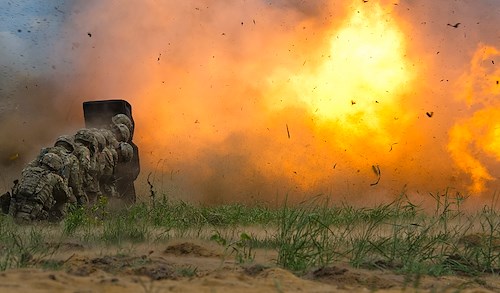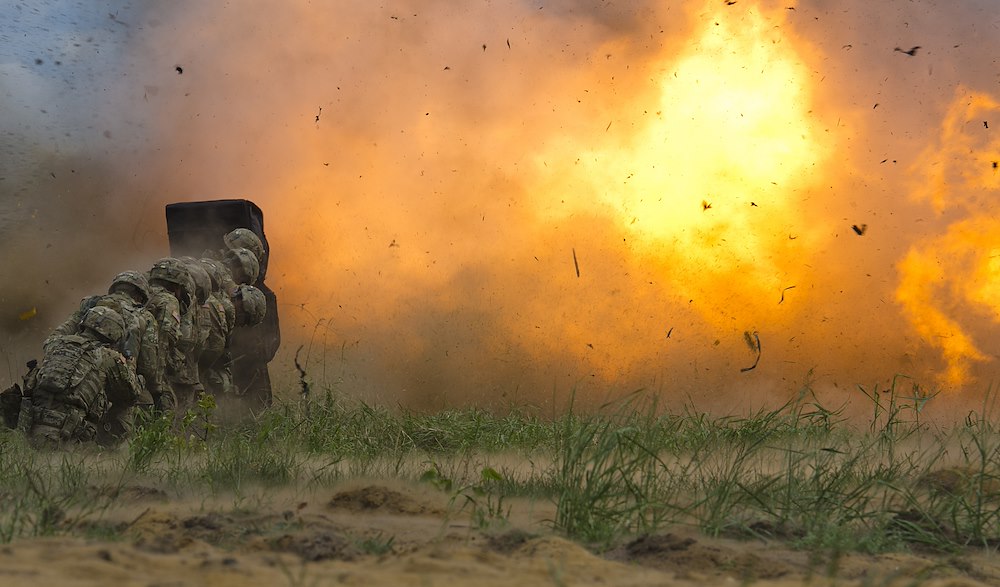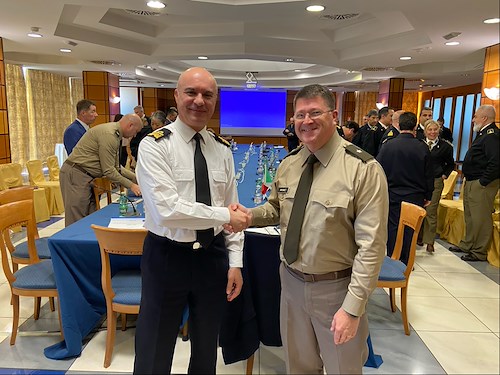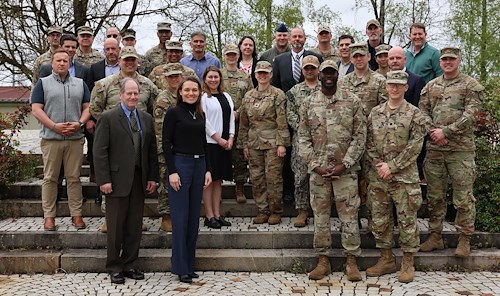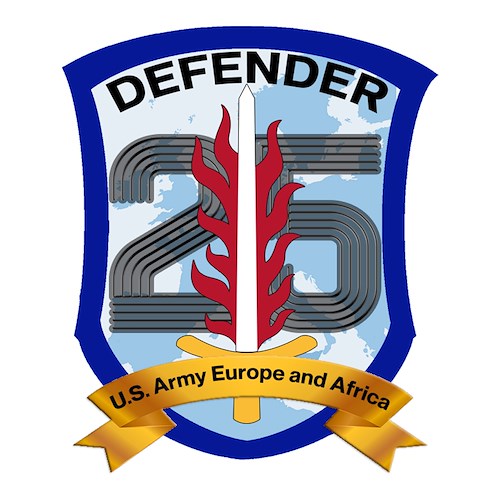Gallery contains 4 images
×
Photo 1 of 4
US Soldiers hone explosive capabilities at Saber Strike 17
Engineer Soldiers with Alpha Troop, Regimental Engineer Squadron, 2nd Cavalry Regiment, conducted engineer training qualification tables, as part of the Saber Strike 17, where they performed basic demolition at the Bemowo Piskie Training Area in Bemowo Piskie, Poland, June 8, 2017. Saber Strike 17 is a U.S. Army Europe-led multinational combined forces exercise conducted annually to enhance the NATO Alliance throughout the Baltic region and Poland. This year's exercise includes integrated and synchronized deterrence-oriented training designed to improve interoperability and readiness of the 20 participating nations’ militaries. (U.S. Army photo by Sgt. Justin Geiger)
Photo by: Sgt. Justin Geiger
Photo 2 of 4
US Soldiers hone explosive capabilities at Saber Strike 17
Engineer Soldiers with Alpha Troop, Regimental Engineer Squadron, 2nd Cavalry Regiment, conducted engineer training qualification tables, as part of the Saber Strike 17, where they performed basic demolition at the Bemowo Piskie Training Area in Bemowo Piskie, Poland, June 8, 2017. Saber Strike 17 is a U.S. Army Europe-led multinational combined forces exercise conducted annually to enhance the NATO Alliance throughout the Baltic region and Poland. This year's exercise includes integrated and synchronized deterrence-oriented training designed to improve interoperability and readiness of the 20 participating nations’ militaries. (U.S. Army photo by Sgt. Justin Geiger)
Photo by: Sgt. Justin Geiger
Photo 3 of 4
US Soldiers hone explosive capabilities at Saber Strike 17
Engineer Soldiers with Alpha Troop, Regimental Engineer Squadron, 2nd Cavalry Regiment, conducted engineer training qualification tables, as part of the Saber Strike 17, where they performed basic demolition at the Bemowo Piskie Training Area in Bemowo Piskie, Poland, June 8, 2017. Saber Strike 17 is a U.S. Army Europe-led multinational combined forces exercise conducted annually to enhance the NATO Alliance throughout the Baltic region and Poland. This year's exercise includes integrated and synchronized deterrence-oriented training designed to improve interoperability and readiness of the 20 participating nations’ militaries. (U.S. Army photo by Sgt. Justin Geiger)
Photo by: Sgt. Justin Geiger
Photo 4 of 4
US Soldiers hone explosive capabilities at Saber Strike 17
Engineer Soldiers with Alpha Troop, Regimental Engineer Squadron, 2nd Cavalry Regiment, conducted engineer training qualification tables, as part of the Saber Strike 17, where they performed basic demolition at the Bemowo Piskie Training Area in Bemowo Piskie, Poland, June 8, 2017. Saber Strike 17 is a U.S. Army Europe-led multinational combined forces exercise conducted annually to enhance the NATO Alliance throughout the Baltic region and Poland. This year's exercise includes integrated and synchronized deterrence-oriented training designed to improve interoperability and readiness of the 20 participating nations’ militaries. (U.S. Army photo by Sgt. Justin Geiger)
Photo by: Sgt. Justin Geiger
U.S. Soldiers from Alpha Troop, Regimental Engineer Squadron, 2nd Cavalry Regiment, could be heard shouting over and over, “fire in the hole” during several iterations of an urban breaching training exercise as part of Saber Strike at Wyrebly Range, Poland June 7, 2017.
Saber Strike 17, a month-long exercise from May 28, 2017-June 24, 2017, is in year seven of a long-standing U.S. Army Europe-led training exercise designed to enhance interoperability and to improve joint operational capabilities across a variety of mission sets among NATO Allies and regional partners.
Battle Group Poland Soldiers conducted the multi-day training event to qualify the U.S. engineer platoon on specific demolition tasks relevant to their duties here as part of the Enhance Forward Presence.
Sustaining combat readiness on bridge destruction, road crater missions and explosive breaching through obstacles, improves the capabilities Alpha Troop can provide to the infantry units they support.
“Throughout this training event we were conducting engineer training qualification tables,” said 2nd Lt. Dave Truong, Platoon Leader, Alpha Troop, Regimental Engineer Squadron, 2nd Cavalry Regiment. “Performing basic demolitions, like firing improvised explosives, improvised bangalores and grapeshot charges to train on what to do when we don’t have our conventional explosives with us.”
Situational Training Exercise events are active training exercises designed to teach Soldiers and leaders specific skills they will use later during the Field Training Exercises and to capitalize on the training opportunities that aren’t easily available at their home station. The FTXs are decisive action focused, battalion-level training exercises that mimic real-life situations.
Sgt. Stephen Lewis, Combat Engineer, Alpha Troop, Regimental Engineer Squadron, 2nd Cavalry Regiment, emphasized the importance of having the opportunity to be trained on new skill sets.
“Participating in Saber Strike and learning new tactical skills when our platoon cross trained with a Special Forces Engineer Sergeant, has given me the opportunity to conduct different training events for the first time in my career,” said the troop’s non-commissioned officer.
This year’s FTXs will focus on the Enhance Forward Presence battle groups and their interaction with bilateral units from other participating countries. Integrating common assets to fulfill capability gaps creates a strong military alliance that can deter real or potential threats.
“I’ve been able to work with the (Polish) 15th Engineer Battalion, 15th Mechanized Infantry Brigade and they fill in capability gaps in our organization,” said Truong. “The capability gaps they cover include horizontal engineer assets, which is more of a heavy construction and earth moving capabilities. They also have the ability to do gap crossing operations.”
The demands of Saber Strike may increase in the training tempo, improving overall readiness and interoperability of NATO’s Allies and partners, however, during the urban breaching training exercise, the engineer leaders and Soldiers had the opportunity to only focus on the task at hand.
“The biggest benefits of this training are we’ve been able to slow things down and conduct more hands-on training,” said Truong, as he expressed his thoughts about the event. “Our Soldiers have been able to calculate charges and train on how to emplace those charges properly. That way junior leaders are doing the quality controls and quality assessments on the explosives, and then junior Soldiers are able to emplace and build charges.”
This multinational training exercise promotes regional stability and security while strengthening partner capabilities and fostering trust. The combined training opportunities that it provides greatly improve working relationships among participating NATO Allies and partners.
It’s rewarding to be able to work with our NATO Allies and partners, said Lewis. Learning the limitations of each other’s equipment and sharing standard operating procedures, techniques and tactics are some of the biggest benefits of working alongside our NATO counterparts.

